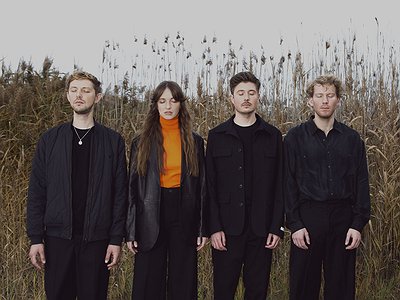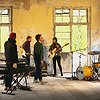Part 1
Name: Conic Rose
Members: Franziska Aller (bass), Silvan Strauß (drums), Johannes Arzberger (piano), Bertram Burkert (guitar), Konstantin Döben (trumpet, flugelhorn)
Interviewees: Konstantin Döben, Bertram Burkert, Franziska (“Franzi”) Aller, Johannes (“Johnny”) Arzberger
Nationality: German
Current Release: Conic Rose's new single "Gleisdreieck" is out now. Their debut full-length Heller Tag ("Bright Day") will follow February 17th 2023.
Recommendations: Just Kids Patti Smith (book); The Salt of the Earth by Wim Wenders, and Juliano Ribeiro Salgado (film)
if you enjoyed this interview with Conic Rose and would like to find out more about the band, visit their official homepage. They are also on Instagram, and Facebook.
When did you start writing/producing/playing music and what or who were your early passions and influences? What was it about music and/or sound that drew you to it?
Konstantin: I started playing the trumpet at the age of 6. Like most brass players, I began with a classical education. I realized very quickly that I wanted to play more creatively than was possible for me in the classical repertoire.
I started playing gospels and pop songs with my father on the piano - those were my first beginnings in improvising. Then I started listening to CDs up and down - Ella Fitzgerald, Chet Baker, Miles Davis …
Franzi: I started playing the guitar at the age of 6. My earliest influence was my grandfather who himself also played the guitar. I switched to the bass much later on when my school band needed a bass player. It didn’t take long for me to realize that this was my instrument.
When I listen to music, I see shapes, objects and colours. What happens in your body when you're listening and how does it influence your approach to creativity?
Konstantin: When music touches me, I usually feel strong excitement in my body. It activates me, euphorizes me.
Franzi: Music is the only thing for me that can take me to a place that allows me to lose myself and has the ability to bring out a special kind of beauty in humanity.
Bertram: Within time I realized that while listening to music, which includes listening while playing, I’m often occupied by thoughts of judgment or classification of what I hear. I think as a music creator it’s important to have a certain taste, certain likes and dislikes. It guides me towards the sounds and musical places I want to hear. It also feels pleasurable to avoid automatisms that I recognized as something I don’t identify with.
At the same time - as a listener - it’s my aim to be far away from those thoughts. I had some wonderful moments - the most intense with John Coltrane's Meditations - where I could just hear the individual person behind the music, there was no comparison or future or me as a musician.
You are revealing so much truth about yourself within creative processes. Those personal fights, enlightenments or inabilities are what I try to perceive - maybe what I observe tells more about me, than it tells about the musicians I listen to.
Johnny: Music turns off my head. When I’m creating something new I usually start with loops and drones that can bring me to a deeper and slower state of mind.
How would you describe your development as an artist in terms of interests and challenges, searching for a personal voice, as well as breakthroughs?
Konstantin: My development as an artist is a mirror of my development in life. I keep questioning, meditating and practising.
Bertram: In a way music feels like a drug - with very harmless side effects. If I have a week off - or better three weeks - with time to sit with my guitar, playing along with my favorite songs it makes me feel so peaceful and content. I feel super connected to practicing. It’s one of the few things in life where I always have the feeling of using my time in a precious way. It also feels a bit like a healing process for my brain. I would say I really need it and I get unbalanced without practicing.
While this stabilizes me, my musical interest and wishes / projections differ a lot and sometimes I suffer by being drawn to so many different sorts of music. In these moments I have a bad conscience and I think: “Why can’t I decide and focus on one thing to go deeper and deeper and find my voice there”. In the next moment I listen to Paco de Lucía or Blake Mills or Daniel Lanoise (or Jonny Greenwood, Richard Strauss, Cameron de la Isla, John Coltrane, Tony Scherr) and I will take any guitar, to pull out some secrets from whatever they do.
In the end I’m always led more by pleasure than by a plan or goal that I want to achieve.
Johnny: My goal is to be authentic in what I do in life. That’s the same in music to me. It always changes your interests and challenges just by hearing something new for example.
I’m at the point of not listening to much music randomly anymore since it can distract me a lot. I try to focus more on my instruments.
Tell me a bit about your sense of identity and how it influences both your preferences as a listener and your creativity as an artist, please.
Konstantin: When I lived in a Buddhist monastery for a few weeks, I perceived music differently afterwards and it also changed my playing. I reached a different level of awareness than in my everyday life in the huge city of Berlin.
I also look for this connection when I make music. In the best case, I feel at one with the people and the music, I am present and gain energy instead of losing it. That also leads to feeling less separated. It's a good feeling and you don't play to strengthen your sense of identity, you're just in the flow. In creative processes I always try to detach myself from my identification with my self-image, to make myself independent of it and thus let a deeper essence and intuition speak.
I think I look for this essence above all in music as a listener. What then comes along can make the whole thing even more exciting.
Johnny: I see myself as a producer. I love to set up moods, flavors, drones or frames for other musicians to fall in love and get homely with.
What, would you say, are the key ideas behind your approach to music and art?
Franzi: I try as much as possible to approach music from an emotional state. And for me it is always an opportunity to communicate with whomever I play with through this language of music.
Konstantin: With Conic Rose, we constantly move between the most diverse states. We record improvised solos, work on them, bring them into a new form, a musical theme emerges from it, the theme is doubled by a new instrument. We investigate what else is needed. We experiment and add. Further arrangements are made. New improvisations are recorded again and so on. Until in the end, a piece emerges that is both constructed and intuitive and has emerged from the moment.
Intuition, form, narrative, presence, calculated constantly alternate in our process!
How would you describe your views on topics like originality and innovation versus perfection and timelessness in music? Are you interested in a “music of the future” or “continuing a tradition”?
Franzi: I'm interested in both history and future. I enjoy listening to players who are influenced by traditions but who are also individualistic in searching for new sounds.
Konstantin: What interests me most in music is whether I can find something like the essence. I think feelings, energy, something vital leads me to that essence. What form to put that in is a choice. I tend not to strive for ideas like perfection and timelessness, but I still find it interesting to think about what that could be.
Bertram: What I‘m interested in is the vibe of a song and the sound of the instruments. If it has the power to alter my mood, to bring me in another place of myself, to nurture one emotional seed in an intense way - I‘m interested and I will always come back to that music.
Johnny: I always try to be innovative and create something that’s never been there before. But I always go back to traditional or classical music to inspire myself.
For example, we listened to Bach or Chopin when we were looking for new ideas.
Over the course of your development, what have been your most important instruments and tools - and what are the most promising strategies for working with them?
Conic Rose: The trumpet, the guitar, the drums, the bass and the piano are of course the most important instruments. And then we have endless tools to shape them, to play around, to experiment.
For example, we love this little OP-1 synthesizer because it helps us stay intuitive when producing. We often use the sampling function of this tiny thing. A sampled husky trumpet becomes a super interesting keyboard sound. We love doing things like that.






